US dockworker strike sees little chance of early resolution
Major Dockworker Strike Hits US Ports from Maine to Texas, Halting Trade and Disrupting Economy

The United States is facing one of the largest dockworker strikes in modern history. Around 45,000 dockworkers at ports stretching from Maine to Texas went on strike Monday night. This strike is the biggest of its kind in the world in this century, causing significant disruptions at many of America’s largest ports.
Queues Forming at Ports By the second day of the strike, long queues of ships are starting to form outside key ports on America’s east coast. Experts say that this strike could cost the US economy as much as $5 billion each day if the ports remain closed. The workers belong to the International Longshoremen’s Association (ILA) union, and their main demands include a wage increase of more than 70% and a promise from port operators not to replace workers with machines.
Political Impact and Economic Consequences This strike comes at a sensitive time, with a major election year underway in the US. Both President Joe Biden, a Democrat, and former president Donald Trump, the Republican candidate for the upcoming election, have voiced their support for the ILA. President Biden has even threatened foreign companies involved in the dispute, putting pressure on the United States Maritime Alliance (USMX) to meet the workers’ demands.
However, neither political party has taken significant steps to resolve the strike so far. In the meantime, the Department of Transportation has asked shipping companies to cancel the extra fees they added in preparation for the strike. The standstill at the ports is already having a massive impact on the economy, with hundreds of ships piling up, waiting to either dock or leave.
Container Ships Backed Up According to Danish container experts at eeSea, there are over 200 container ships, carrying more than 1 million containers, either in port or on their way to strike-affected areas. Vessel tracking data shows that some ports are already becoming highly congested. Savannah, one of the largest container ports on the east coast, is now the fourth most crowded container port in the world, according to data from the container advisory firm Linerlytica.
BOEM Completes Environmental Review Ahead of Gulf of Maine Wind Leases
Impact on Key Industries The effects of this strike go beyond just container shipping. The Gulf Coast ports, including Houston and New Orleans, handle up to 70% of the United States’ exports of crude oil, refined products, and natural gas. They are also a critical part of the country’s petrochemical supply chain, including plastics and chemical products.
In addition, about 60% of US grain and soybean exports pass through these Gulf Coast ports, especially New Orleans. These ports also play a major role in shipping industrial machinery and heavy equipment, particularly to Latin America and Europe.
The automotive industry is also feeling the heat. Between 30% and 35% of all cars and parts imported and exported by the US travel through the east coast ports. These ports are especially important for vehicles from Europe.
Finally, these east coast and Gulf Coast ports are responsible for handling about 30% of America’s imports of essential construction materials like steel, cement, and other building supplies, primarily from Europe and Latin America.
No End in Sight With no clear solution in sight, this strike could continue to cause significant problems for the US economy. As foreign companies and American businesses suffer from delays, the strike shows no signs of ending quickly. Analysts warn that if the strike goes on much longer, the effects will ripple through many industries, leading to shortages and higher prices for goods in the US.
In conclusion, the ongoing dockworker strike at ports from Maine to Texas has created a large-scale disruption in America’s supply chain. The situation is growing more severe each day as ships continue to wait and industries feel the effects. Both the government and businesses are under pressure to find a solution before the situation worsens.
